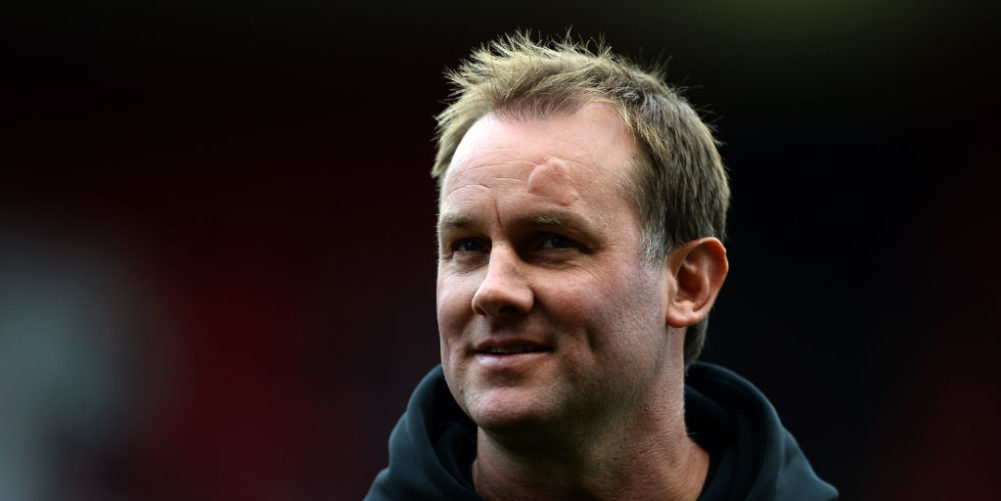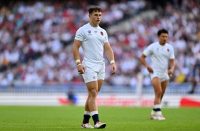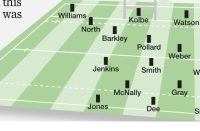As Hartpury‘s reputation grows, director of rugby John Barnes tells NEALE HARVEY why their programme will continue to produce world-class talent.
Recent stats show Hartpury to be the joint-top talent producing school/college in the world in terms of current top-flight pro contracts. How proud are you of that?
With so many good schools in England and considering how outstanding some of the South African places are, we’re incredibly proud. We’ve always tried to keep a record of guys who’ve gone on to professional contracts so it’s great to be recognised independently. The stats don’t include our university guys either, just our former 16 to 18-year-olds. There are some top schools world-wide that are rich in history and have produced some brilliant international players, so to be competing with them, and in most cases exceeding their numbers, is excellent.
Give us a flavour of who some of your 38 current professional alumni are?
It’s easy to pick out some of the main ones like Ross Moriarty and Alex Cuthbert, who are both British Lions, while Dan Robson and Harry Randall both came through us as outstanding young No.9s. Jonny Hill has been exceptional for Exeter this season and will hopefully be capped, while Ellis Genge and Jonny May are already doing exceptionally well in England shirts. I guess they’d be the highest profile ones, but you’ve also got Tom Savage, now in Japan after being at Gloucester for a long time, and among the current Gloucester ranks are Louis Rees-Zammit and Stephen Varney. Others include Elliott Stooke (Bath), JJ Tonks (Northampton), Aaron Hinckley (Exeter), Billy Burns (Ulster) and Richard Barrington (Saracens). We’re represented at pretty much every Premiership club.
How has the success of this remarkable production line been achieved?
I’ve been here ten years and it started before I came, so it’s just been a gradual build-up of the programme over the years. We now have five university sides, six college sides for U18s and our Championship side as well, so it’s just grown and grown and we see it as our job to improve players at every level, alongside their education. We’ve increased our resources accordingly, particularly at the younger levels because we know there are boys who will come through.
One of the big benefits we have is a lot of our boys are residential so you have a lot of access to them and after school they can come in and do extra skills and analysis sessions. It literally is a two-minute walk from the classrooms to our training facilities so everything is in place for them to improve and it’s a model a lot of colleges in England are looking at and getting good returns from.
Are you having to turn people away now?
We try not to turn anyone away but the numbers that apply here to do BTECs and for a rugby assessment are huge. For example, in the next fortnight we have a half-term assessment week planned for over 300 applicants. These kids are 15 now and we have another event in February, so that’s around 600 kids looking to come here next year, which is tremendous. Having six teams at U18s gives everybody an opportunity and they’re all coached by good staff members who are teachers here as well. When you have so many players and you improve lads like we do, a lot more will move on to the next stage. We have students from all over England and we take a lot from Wales as well now with having close links to the four Welsh regions. A lot of it comes from reputation and word of mouth.
Do you see colleges and universities having a bigger role in player development in future?
It’s a huge area in the RFU pathway now and as long as there’s investment from the schools and colleges themselves, they’ll be successful. Beechen Cliff School and Bath Rugby has been a good example of a partnership that has flourished and a lot of Beechen’s players have come to the fore in the Premiership. St Paul’s in London are close to the London Irish set-up and I think the RFU will continue to encourage that development, but schools and colleges also need to play their part by investing time, effort and money into these programmes. You can’t just rely on the RFU to help out and at Hartpury we’ve been lucky in being able to invest in coaches and infrastructure.
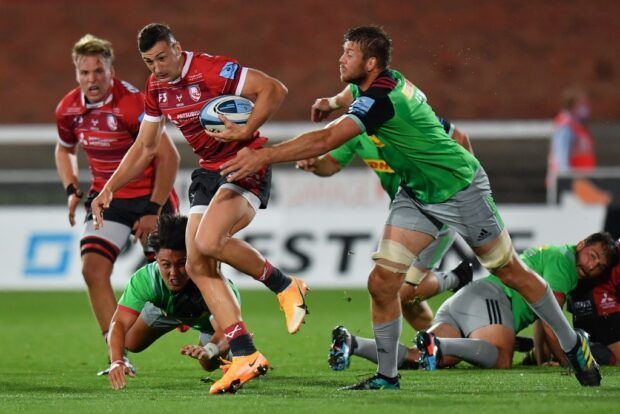
How strong is the BUCS League becoming now?
It’s been really good and since the Super League started three or four years ago, we’ve seen more universities investing their own money and the likes of Durham, Leeds Beckett, Cardiff Met and Exeter have become really strong.
Exeter University have been one of the powerhouses over the last three or four years and they’re working their way up the National Leagues as well now. You’ve seen a lot of Exeter Uni players getting game time with the Chiefs, while Bristol recently signed back rower Fitz Harding from Durham and he got his Premiership debut as well. While the BUCS Super League is different to Premiership Rugby, it improves a player’s skillset enormously and with club finances in the top-flight coming into focus now, they are looking more and more towards potentially cheaper players who are playing at a good level at university. The results are there to see.
Part of the Edward Griffiths ‘English Championship’ plan was to take some academies out of Premiership control and potentially place them at Universities. What did you make of that idea?
There was a lot of good stuff in what Ed produced but with the academies currently based at Premiership clubs it was always going to be difficult to change that. The system was set up years ago and whether that was the right decision will always be the hindsight question. Could they have set up regional academies with some based within colleges instead? Maybe, but they didn’t and I don’t believe clubs will release their academies now unless they are forced to. That said, a lot of what Ed said was good and hopefully some of it can be taken forward.
Conor O’Shea took over as the RFU’s director of performance earlier this year, part of which was looking at player pathways. Have you had any dealings with him yet?
Not really. Unfortunately, there are bigger things for the RFU to deal with at the moment but once they eventually do get over the main problems with Covid-19, I’m sure he’ll be in touch. Their priority at the moment, though, is getting rugby and crowds back.
You’ve always had Gloucester Rugby on your doorstep, but could relationships have been better?
Yes, potentially they could. As with many Premiership clubs, though, there’s always a high turnover of staff. While at Hartpury we’ve had the same staff here for quite a while, there’s been a fair bit of change at Gloucester and you’re always dealing with new directors of rugby, head coaches and academy directors and starting again. New people who come in don’t necessarily understand what’s happened in the past and there have been a few issues. We’ve always dealt with things positively, though, and they still use a lot of our players and some of their guys attend the university now. They’ve got a new coaching team in again now under George Skivington, while Peter Walton has only been there this year as academy manager, so it’s developing again. George has been settling in but I’ve already met with him a couple of times and he’s been very proactive in wanting to work with us. He’s been impressed with what he’s seen so far, with No.9 Varney challenging Willi Heinz and Rees-Zammit doing what he has, so he’s already realised we’ve got a pool of talent he might want to tap into. That’s looking very positive.
Any word on when your Championship side might get back playing?
We’re hoping to get going again, potentially in January, but that depends on a lot of things. Covid-19 testing is a big question mark because while the Premiership clubs have done it, it’s cost them an excessive amount of money. You saw with the Sale issue recently why testing is done but the cost of it is too much for Championship clubs week-in, week-out. A big discussion point is how we can get back to full training because if you’re going to do full contact, with a six or eight-week pre-season lead-in, you have to be tested. That’s a big stumbling block because with the exception of perhaps Saracens and Ealing, clubs cannot afford up to £8,000-a-week. Everyone wants to get back, though, so along with getting crowds back, which is equally important for some clubs, those discussions are ongoing.
Has the women’s Premier 15s not led the way, with an adapted game meaning they’ve been able to restart without full testing?
They’re playing under adapted laws to restrict the number of scrums and lineout drives etc, so we could look at that. Our Gloucester-Hartpury girls played Exeter last Saturday and there were only three scrums in the entire game, but the issue around those adapted laws in the Championship is how it affects promotion and relegation. Can a team be promoted or relegated under adapted laws when you’re playing a different game to what’s being played above or below you? With the women’s 15s, no one is being promoted or relegated so it’s a different scenario. The main aim of the RFU and Championship is to play the full laws to keep the integrity of the league as best they can, but you never know and those discussions are ongoing. What I would say from at Hartpury perspective is that the key thing is to play – if that means adapted laws, we’ll be fine with that.
What concerns do you harbour over the Championship and its clubs right now?
It’s difficult for everyone at the moment and crowds are hugely important for income streams at clubs like Bedford and Coventry, who have built their businesses on having decent home crowds of 2,000-2,500 every other week. Within the Championship every club is uniquely different and you’ve only got to compare ourselves with Ealing or Saracens to see that. We all have our issues but the clubs that are part-time are potentially in a more positive position right now. It’s tough for all clubs, but more so for those who need decisions on crowds and testing.
Is it time to just take Saracens and Ealing out of the equation by putting them into a 14-team Premiership and then ring-fencing?
There’s always that debate and over the last three years we’ve seen how Ealing have challenged Bristol, London Irish and Newcastle, although in every case the relegated side has gone back up. You’d think Saracens will do the same so could you take them and Ealing up and have a 14-team top-flight? I’d imagine those conversations are being had, but one thing I do know is that Hartpury are not in a position to challenge for promotion.
Your backs coach, Jonny Goodridge, recently joined Worcester, so how much of your role is about developing coaches as well as players?
It’s exactly the same as players and while it’s always disappointing to lose a coach, to see someone move into the Premiership or another top league means we’ve done our job. Jonny came here not long after finishing playing and was outstanding for us and earned his reward. Sean Marsden (Bristol) and Mark Irish (Bristol, now Worcester) have also moved up and I’m just as proud seeing those guys improve and move on as I am our players. Ryan Lamb’s come in now and he’ll be the next one to do well and potentially move on. You build relationships with guys who are part of your coaching team but we’ll never stand in the way of somebody progressing their career in the top-flight.
Would you like to see more Championship coaches given a shot higher up?
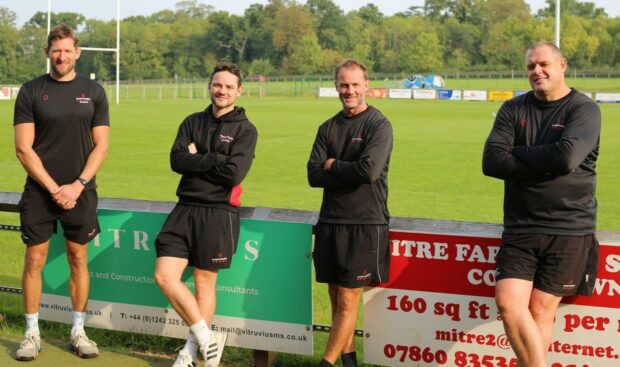
Certainly, but it’s just like players in that they need chances to step up. Lee Blackett’s done a great job at Wasps after learning his trade in the Championship and one of his right-hand men is Ian Costello, who was at Nottingham when we first came up and is a real top bloke who is a good thinker about the game. We chatted to him after games and it’s good to see him doing really well at Wasps, too. Just as there are a lot of Championship players who are good enough to play in the Premiership, a lot of coaches deserve that opportunity as well. With money being tight, maybe clubs will look for cheaper options and you’ll see more of it happening.
Any top-flight coaching ambitions yourself?
Not at the moment. I learnt a lot about life’s realities when I was working as a coach under a top bloke in Richard Hill at Bristol. In 2007, we finished third in the Premiership and he was being talked about for the England job, but then the next year we struggled and not long after that he was sacked. That was a big lesson for me and with having Gloucester next door to us at Hartpury, I’ve seen the turnover of directors of rugby, head coaches, coaches and academy managers there. At Hartpury, you get to run an outstanding programme from ages 16 through to our Championship team and it’s a great job for me. Along with our head coach Mark Cornwell, I’m enjoying it still, which is important, and it’s great to be able to bring through the next good player or coach. Hartpury’s been a big part of my life for ten years and I’m not looking for any other role.
Does it bug you that some people still decry the presence of university sides like Hartpury and Loughborough in the National League system?
That’s always going to be there but once they allowed universities into the leagues and ourselves and Loughborough went through, it passed the point of no return. I think we’ve established ourselves, though, and we certainly get fewer people having a dig at us now. We produce so many players and it’s not just at the highest level either, we’re producing huge numbers for the community game as well. Cinderford alone had nine ex-Hartpury players in their squad last season so that’s helping them and you don’t come across many National One or Two sides who haven’t got Hartpury alumni playing for them. The number of ex-players we’ve got throughout the Championship and National league is huge, so nobody can accuse us of not playing our part.
Who are the next big prospects bubbling under?
We’ve got some outstanding 16-year-olds but among the guys who’ve come into our university are John and Aristot Benz-Solomon, twin bothers who are outstanding ball-playing props who used to be with Harlequins. At 20, they’ve got really good potential and with ex-Premiership prop Dan Murphy taking over as head coach of our university side, they’ll also get great guidance.

